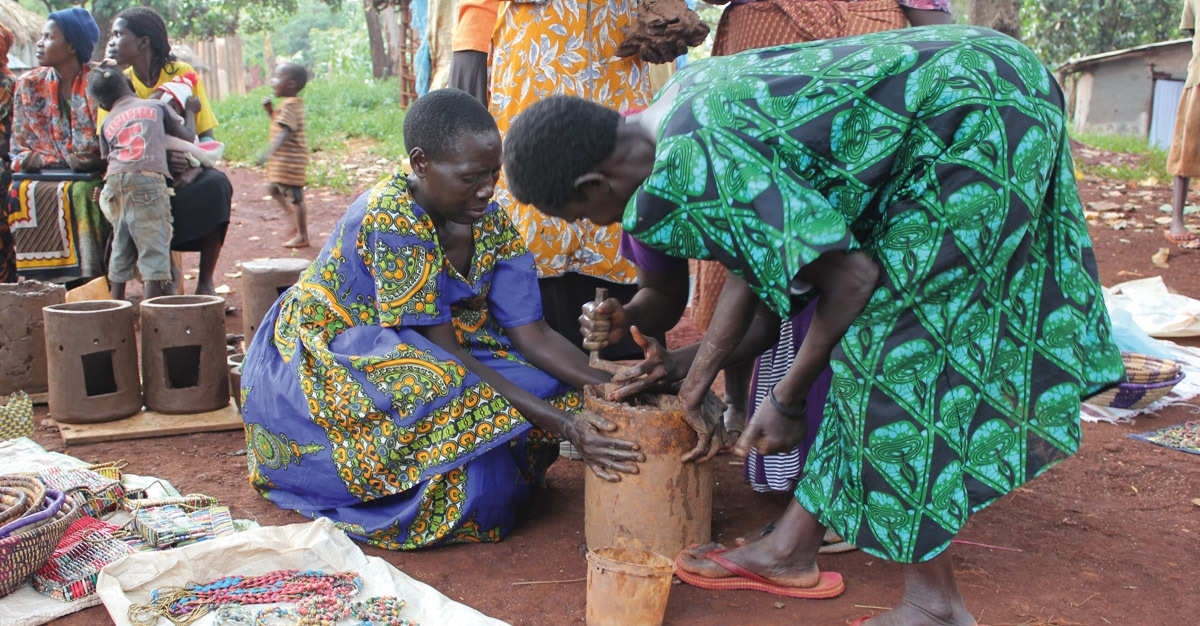|
When we started work in Masese II (Soweto) there were 14 breweries in the slum and many mothers worked at them for a very low wage. Black, toxic sludge ran in streams from these places, which were situated every 15-20 metres. The smoke was acrid and the sludge pits had no fences. There were many reports of children falling into these pits in fatal accidents, or suffering the result of exploding canisters of hot liquid. Some children were fed the dregs of the alcohol mix. If children weren't present at these dangerous breweries, they would be left home alone throughout the day.
One of the ways this was tackled was the provision of micro loans. The team here call them ‘education loans’, because they are given with the aim of helping parents to afford to send their children to school. The most vulnerable households were identified by the Child Protection Team and invited to apply with a basic business plan. They were then given training and a small loan, worth around £20, to start their own business. Once their business was well established and they had earned a reasonable amount, they paid back the loan with a small amount of interest so the money was available for somebody else. As women gradually developed the means to create their own positive sources of income, the breweries started to topple. Within three years the number of breweries in the slum dropped from 14 to 1. One mother called Katherine started with her first loan selling vegetables, she paid it back, then got another to start her out with a standpipe selling water. She then paid back the second loan and applied for another loan to build two rooms to rent. Katherine is now a successful business woman. Each time she has borrowed, she has paid back more into the fund which has then gone to other people in need. Due to the prevalence of AIDS in the area there are many grandparent headed households. Some grandmothers in the area look after up to 13 children in one small hut and have no means of creating an income, let alone send their children to school. Using the education loan system, a group of four grandmothers pooled their loans and started a pottery cooperative. The group soon grew to 10 women who met together every week to work together purifying clay taken from the Nile riverbed. Over time the group has grown to 42, they have a booming business and have made enough money to pay for better clay, their own kiln and a pottery wheel. This is just one example of hundreds of cases where small loans in this slum community have enabled vulnerable households to gain a productive source of income and send their children to school. When previously all there was throughout the area were toxic breweries, now the community is buzzing with many small industries. There are stalls that sell vegetables, kale, berries, cabbage, fruit, stalls selling cooked food, stalls selling water from standpipes and more importantly than this, there are a great many more children going to school. Since the success of education loans in Masese II, Child Protection teams have been introducing the scheme into three new areas; Loco, Masese I and Masese III. Support usComments are closed.
|
RECEIVE OUR EMAILSBlog Categories
All
Archives
July 2024
|
|
JOIN US ON SOCIAL MEDIA
|
Annual Report | Contact Us | Jobs | Media Centre | Resources | Shop
Accessibility & Policies: Accessibility | Equity, Diversity & Inclusion Policy | Complaints| Privacy Policy | Safeguarding
Accessibility & Policies: Accessibility | Equity, Diversity & Inclusion Policy | Complaints| Privacy Policy | Safeguarding
Children on the Edge, 5 The Victoria, 25 St Pancras, Chichester, West Sussex, PO19 7LT, UK | 01243 538530 | [email protected]



 Give monthly
Give monthly Fundraise for us
Fundraise for us RSS Feed
RSS Feed
